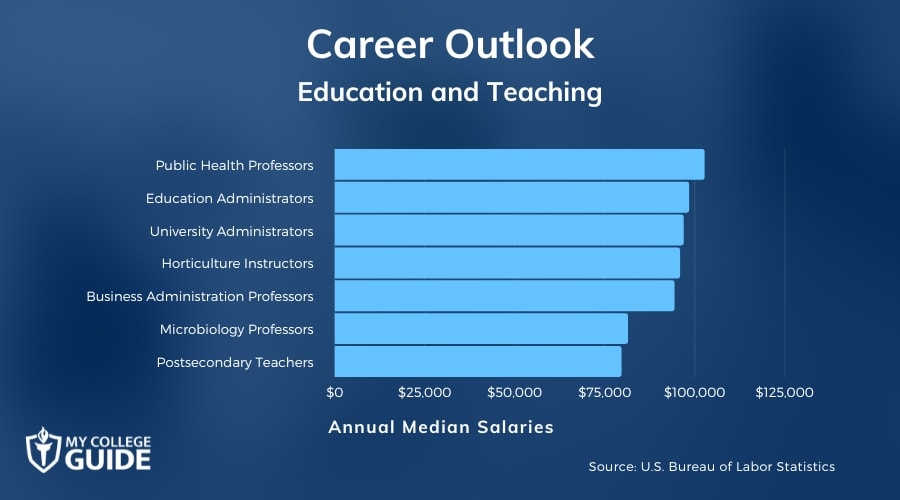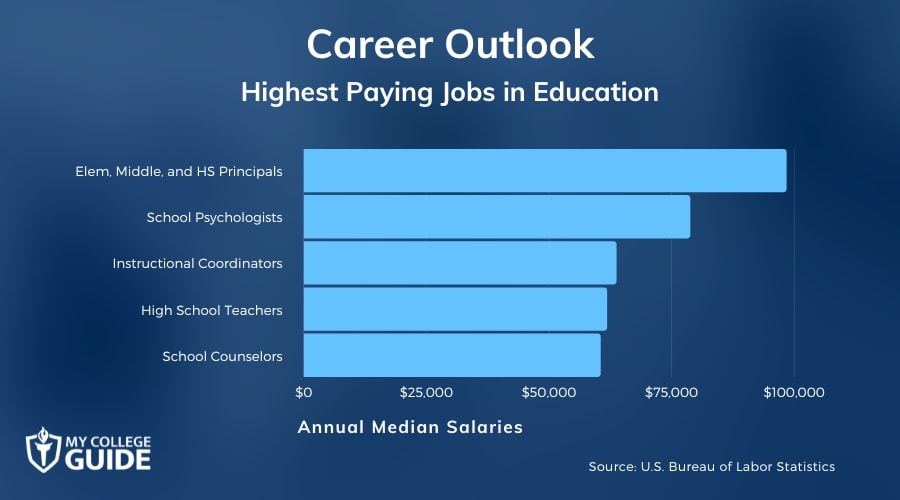If you have a passion for working with children and want to make a difference in this world, then pursuing the various education careers available can help you reach those goals.

Educators have an essential job within our society, and they work tirelessly to instruct and educate the next generation of children in order to prepare them for life in the adult world.
Editorial Listing ShortCode:
You may be wondering, “what can I do with a degree in education?” Luckily, even if teaching is not your passion, but education is, there is a wide range of career opportunities available for those with an education degree.
What Can You Do With an Education Degree?

You may wonder, what can you do with an education or teaching degree? When most people think of a degree in education, they think of teaching positions in either a public or private institution.
You can choose to take your education degree and become a kindergarten or elementary teacher, middle school teacher, or high school teacher. If you prefer working with higher education and adults, you can choose to become a postsecondary teacher at a college or university.
Editorial Listing ShortCode:
If you prefer to work behind the scenes instead of in a classroom, you could be interested in becoming a school administrator or a curriculum director. An education degree is not just for teaching, you can choose to work in a variety of positions that best suit your skills and passion for educating.
5 Things You Can Do with a Degree in Education and Teaching
Earning a degree in education and teaching may allow you to take on many different careers in education. The occupations in education are diverse and varied, meaning there may be something that appeals to you as an occupation and help to answer the question of what can you do with a degree in education.
This list of jobs for education majors features data obtained from the U.S. Bureau of Labor Statistics and offers you a glimpse into the various positions you could apply for with a degree in education along with the projected career growth for the next decade.
1. High School Teacher

Education Requirement: Bachelor’s degree
Projected Job Growth: 5%
High school teachers usually teach one or two subject areas at the secondary level. They may teach a particular grade level or have different classes throughout their day.
They develop lesson plans, organize their classroom, and evaluate their students. Secondary school teachers may work in public schools or private schools.
2. Kindergarten and Elementary School Teacher

Education Requirement: Bachelor’s degree
Projected Job Growth: 5%
Kindergarten and elementary school teachers work with primary education students and are early educators of the youth.
Primary school teachers typically work with one class throughout the day, teaching students multiple basic subjects to prepare them for further school. They create lessons to teach kids basic reading, writing, and math skills and help students learn important concepts such as socialization with peers, problem-solving, and critical thinking.
3. Middle School Teacher

Education Requirement: Bachelor’s degree
Projected Job Growth: 4%
Middle school teachers teach students in the intermediate years between elementary school and high school. They construct on the foundations of elementary school teachers.
Much like other teachers, middle school teachers create lesson plans and implement them in the classroom to teach their students diverse subjects. Some middle school teachers may teach one subject while others teach multiple subjects to one class.
4. School Principal

Education Requirement: Master’s degree
Projected Job Growth: 5%
School principals are responsible for the day-to-day administration of elementary, middle, and high schools. These educators do not work in the classroom, and instead, manage faculty and staff, make curriculums and set standards, and enforce discipline in the schools.
Editorial Listing ShortCode:
Principals also address the communities in which they work to ensure that parents are well-informed of the goings-on at school.
5. School Counselors

Education Requirement: Master’s degree
Projected Job Growth: 10%
School counselors are integral parts of the school environment as they help students plan their educational career and their plans after graduation.
School counselors help students choose classes, explore options after graduation, and navigate school life. Depending on the type of school that they work in, the daily work a school counselor engages in may change.
Online Degrees in Education

There are many different forms that your schooling career may take. Universities may offer different online degrees in education.
Here is a list of four common online degrees in education for you to consider:
- Associate’s Degree in Education: This degree usually takes two years to complete and covers the basic principles of education.
- Bachelor’s Degree in Education: This education degree usually takes four years. Students usually focus on either primary or secondary education or a particular subject.
- Master’s Degree in Education: This degree takes around two years for students interested in taking their degree to the next level. A master’s degree is typically required for positions that focus on curriculum or administration.
- Doctoral Degree in Education: This degree may take anywhere from 4 to 8 years to complete. Students engage in expanding their communication and leadership skills along with learning about educational ethics.
Different universities may offer different degrees depending on the individual strengths of their programs. It is important to ensure you apply to universities with the degree you want to earn.
Education and Teaching Careers & Salaries

There are many ways to utilize a degree in education, from direct instruction of students to helping schools develop curricula and policies that support the educational process.
We have put together a list of the top 40 education or teaching careers & salaries according to data from the U.S. Bureau of Labor Statistics. This list also gives an idea of the options available after graduating with your degree.
| Careers | Annual Median Salaries |
| Public Health Professors | $102,720 |
| Education Administrators | $98,420 |
| University Administrators | $96,910 |
| Horticulture Instructors | $95,910 |
| Business Administration Professors | $94,360 |
| Microbiology Professors | $81,440 |
| Postsecondary Teachers | $79,640 |
| Speech-Language Pathologists | $79,060 |
| History Teachers, Postsecondary | $78,130 |
| Information Technology Professors | $77,910 |
| Public Speaking Professors | $77,560 |
| Art, Drama, and Music Teachers, Postsecondary | $75,940 |
| Children’s Literature Professors | $75,930 |
| Physical Education Professors | $72,440 |
| Writers | $69,510 |
| Secondary Education Professors | $63,910 |
| Curriculum Directors | $63,740 |
| School Counselors, Elementary and secondary | $63,460 |
| Editors | $63,350 |
| Special Education Teachers, Preschool | $62,420 |
| High School Teachers | $61,820 |
| Special Education Teachers, Kindergarten and Elementary School | $61,640 |
| Elementary School Teachers | $61,400 |
| Kindergarten and Elementary School Teachers | $61,350 |
| Middle School Teachers | $61,320 |
| Librarians | $61,190 |
| Career and Technical Education Teachers | $61,160 |
| Kindergarten Teachers, Except For Special education | $60,900 |
| Education Counselors | $60,510 |
| Electronics Technology Instructors | $59,840 |
| Adult Basic Studies Teachers | $59,720 |
| Preschool Directors | $47,310 |
| Teacher Assistants | $45,760 |
| Self-Enrichment Teachers | $43,580 |
| Administrative Assistants | $37,880 |
| Tutors | $36,470 |
| Library Technicians and Assistants | $34,050 |
| Preschool Teachers | $30,210 |
| Substitute Teachers | $30,100 |
| Childcare Workers | $27,490 |
When wondering what jobs can you get with an education degree, it’s helpful to know that qualified educators are a sought-after resource due to the essential role they play in society. The BLS provides valuable data on the overall education and teaching career outlook.
The BLS estimates that the growth rate for careers in education, training, and library fields will expand by 7% over the next 10 years. More specifically, high school teachers are projected to see a 5% growth while kindergarten and elementary school teachers will see a 4% growth rate during this same time frame.
Editorial Listing ShortCode:
If you’re more interested in non-instructional education careers, instructional coordinators are expected to see a 7% growth rate over the next decade. Much like with economics careers or careers in engineering, the salaries for careers with an education degree vary based on experience.
While the numbers above show the median annual salary for a range of teaching and educational career ideas, you may make more or less based on your specific role within your institution.
Common Alternative Careers to Teaching

If teaching does not suit you, then you should not worry. There are many other alternative education major jobs that you could obtain with an education degree.
You should feel free and explore the possibilities that exist for you to embark on a career you enjoy and that fits well with the degree you earn.
- Career Counselor: Career counselors advise their clients as to how to best make their career decisions
- Librarian: Librarians manage libraries and the materials they collect. They organize materials to make them easier to find and help clients with their needs.
- Editor: An editor reviews writing and ensures it follows style conventions and is grammatically correct. They make work freelance or as part of an organization.
- Writer: Writers engage in the practice of writing for their clients, ensuring their vision is met and their writing needs are fulfilled.
- Curriculum Designer: A curriculum designer adapts curriculums and lesson plans to meet modern standards and practices
- Lifestyle Coach: Lifestyle coaches ensure their clients are meeting their lifestyle goals by recommending changes to their lives and making sure they stay on track.
- Educational Consultant: This is a career for people who want to make school districts better by advising them on better educational practices.
- School Psychologist: A school psychologist works with students to help them address the mental health issues and stresses that they face in their school life.
- Corporate Trainer: These trainers teach employees of corporations new skills and give motivational talks and sermons to them to make them more efficient.
- Child Care Director: Childcare directors work in childcare facilities directing their programs and supervising their functions.
There is no set path for someone who earns an education degree but does not want to teach. Depending on where you live and the circumstances at the time, the type and availability of jobs may change.
How to Know if a Career in Education is Right for Me

Though there is no correct answer to this question, there are a couple of signs that may show you have an aptitude for a career in education.
- You care about society’s future: If you worry a lot about what our country will look like in the future, then education may be a good option as a career.
- You like kids: Excluding the important field of adult education, most educators work with youth. If you like kids, then education may be for you.
- You are a leader: If you are a natural at leadership, and can get others to follow your lead, then managing a classroom full of students may suit you.
- You are patient: Teaching is a discipline that requires patience. Dealing with students and the issues that may arise in the classroom requires you to work through them.
Ultimately, only you can tell if a career in education is right for you. Review your career goals and explore more.
Education Licensure and Certifications

Teaching in primary or secondary schools will almost always require you to be licensed to teach by the state in which you teach. One common test you may have to pass in order to teach is the PRAXIS in order for you to teach. You may also have to graduate from a state-approved teaching program at an accredited university.
Editorial Listing ShortCode:
Licensing does not last forever, and if you are licensed, you will have to renew it from time to time, usually around three to five years after you obtain it. Professional organizations may offer opportunities for additional certifications to help you in your career.
Is Financial Aid Available?

Though college tuition is expensive, it does not have to break the bank. There are many sources of financial aid that you can apply for to help pay for your education.
One of the most common forms of aid is federal financial aid. This aid comes in the form of loans and grants from the federal government. To see your eligibility for this aid, visit the Federal Student Aid website to make an account and complete the Free Application for Federal Student Aid (FAFSA).
In addition, other organizations may offer scholarships that you may be eligible to apply and receive for. Employers may also offer assistance to their employees, helping them pay for their education.
What Is an Education Degree?

An education degree is a degree program with a primary focus on education and prepares students to teach a variety of subjects and skills.
When studying education, you may take courses like:
- Child Development
- Curriculum and Instruction
- Early Language and Literacy
- Effective Teaching Skills
- Classroom Management
There are also many educational degree options that can get you started in administrative and management positions within a school district. To help busy adult students take on the challenges of earning a degree, several colleges also offer online education degree programs with flexible scheduling to help you balance work and home obligations.
Is Teaching a Good Career?

Yes, teaching is a good career for many professionals. Teaching may allow you to devote yourself to a subject area you enjoy and develop lesson plans to impart that knowledge to others while making a good living.
Editorial Listing ShortCode:
According to the BLS, middle school teachers earn a median annual salary of $61,400 while high school teachers can expect to earn around $61,820. You may choose to work with a wide variety of different age groups and types of learners based on your preferences and skills.
What Skills Do You Learn in Education?
One of the good things about education is that you may learn many skills which come useful in many different settings.
Observation is one of the most important skills you may learn as managing a classroom requires you to pay close attention to your students and what they do and say. Communication is also extremely important as an educator, as you will likely need to communicate clearly and efficiently to people who have very different viewpoints from you.
How Much Do Education Majors Make?

Jobs for education majors may come with average salaries, though this depends on many variables, such as location, experience, and internal matters.
According to the BLS, high school teachers have a median average salary of $61,820 per year. On the other hand, kindergarten and elementary school teachers make $61,350 per year. Middle school teachers make $61,320 per year. Meanwhile, school principals make a little more per year at $98,420.
What Are the Highest Paying Jobs in Education?

Some jobs in education may pay well. However, the actual salary a particular job may offer depends on a wide variety of factors like geography and experience.
The data for median annual salaries below is from the BLS.
| Careers | Annual Median Salaries |
| Elementary, Middle, and High School Principals | $98,420 |
| School Psychologists | $78,780 |
| Instructional Coordinators | $63,740 |
| High School Teachers | $61,820 |
| School Counselors | $60,510 |
It is important to emphasize the numbers above are national statistics. The actual salary you may be offered for one of the above jobs may differ depending on a variety of factors.
What Do Teachers Do?

Teaching is a very straightforward profession in its definition. A teacher is someone who has students and instructs them on one or a variety of topics.
The actual act of teaching involves many tasks that work together to build students’ knowledge:
- Developing Lesson Plans: Creating a plan for each lesson to ensure that class is structured and that students are learning the correct material is essential to teaching.
- Evaluating Students: Teachers evaluate students through a wide variety of instruments such as homework, quizzes, and exams to see where they are at with their education.
- Communicating to Parents: Teachers build relationships with their parents and inform them of how their children are doing in school.
There are also other responsibilities teachers engage in such as managing the classroom and disciplining students.
Is a Degree in Education Worth It?

Yes, a degree in education is worth it for many professionals. If you want to teach, then an education degree can help you prepare and learn the skills and earn the qualifications to teach at a variety of different levels. According to the BLS, kindergarten and elementary school teachers are projected to see a 4% job growth over the next decade.
Editorial Listing ShortCode:
If teaching is not your calling, then there are many other paths you could take with your degree in education. For example, instructional coordinators are expected to see a 7% job growth over the next 10 years. Depending on where your passion lies, there are a lot of opportunities for education degree holders.
Getting Your Education Degree Online

Earning a degree in education online may be the right next step for your career based on your career goals. Earning this degree may open a whole world of job opportunities.
For those that want to teach, earning an education degree is almost natural as it may provide them with the means to become a teacher. There are many careers apart from teaching that an education degree may also help you attain if you do not want to teach but still want to gain the skills an education degree may come with.
If education sounds like it may be a fulfilling career path for you, you can start researching what earning an education degree entails and what sort of opportunities it may help you attain.
